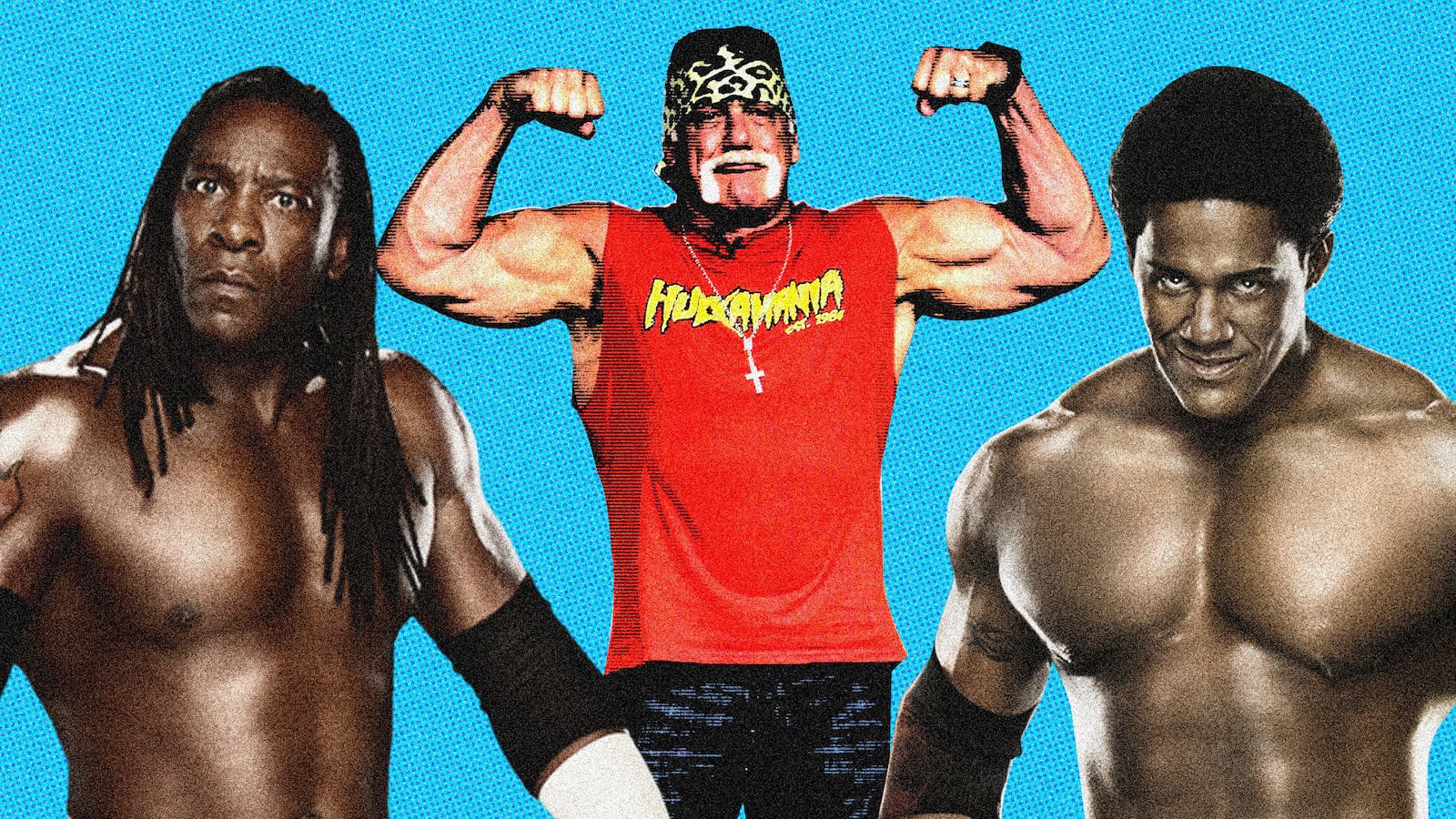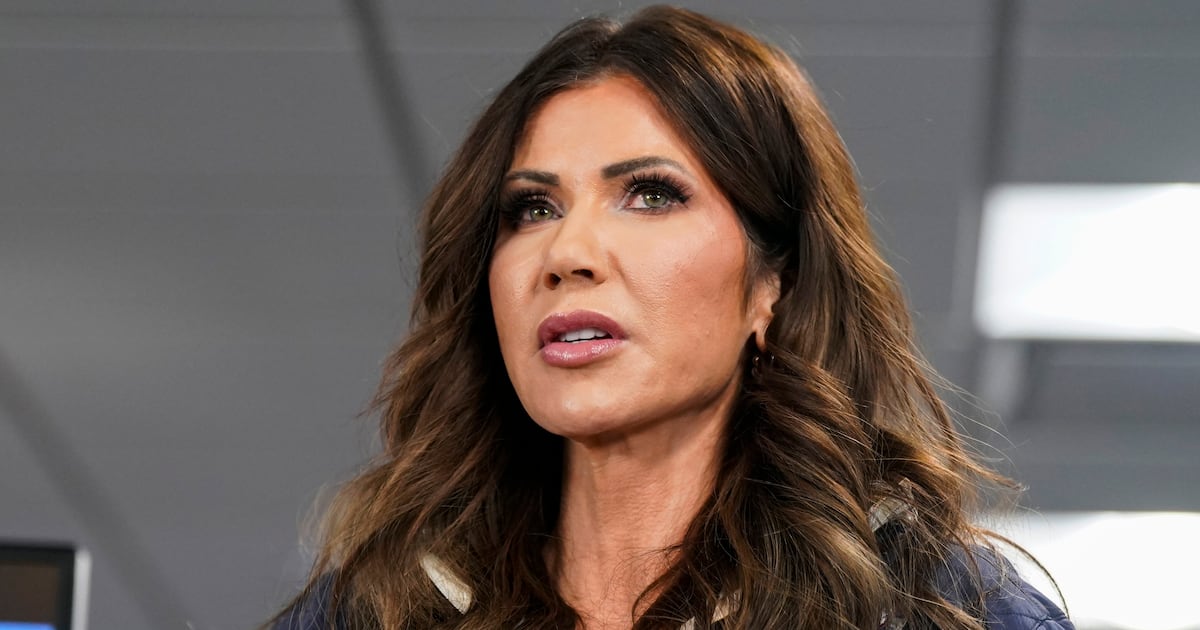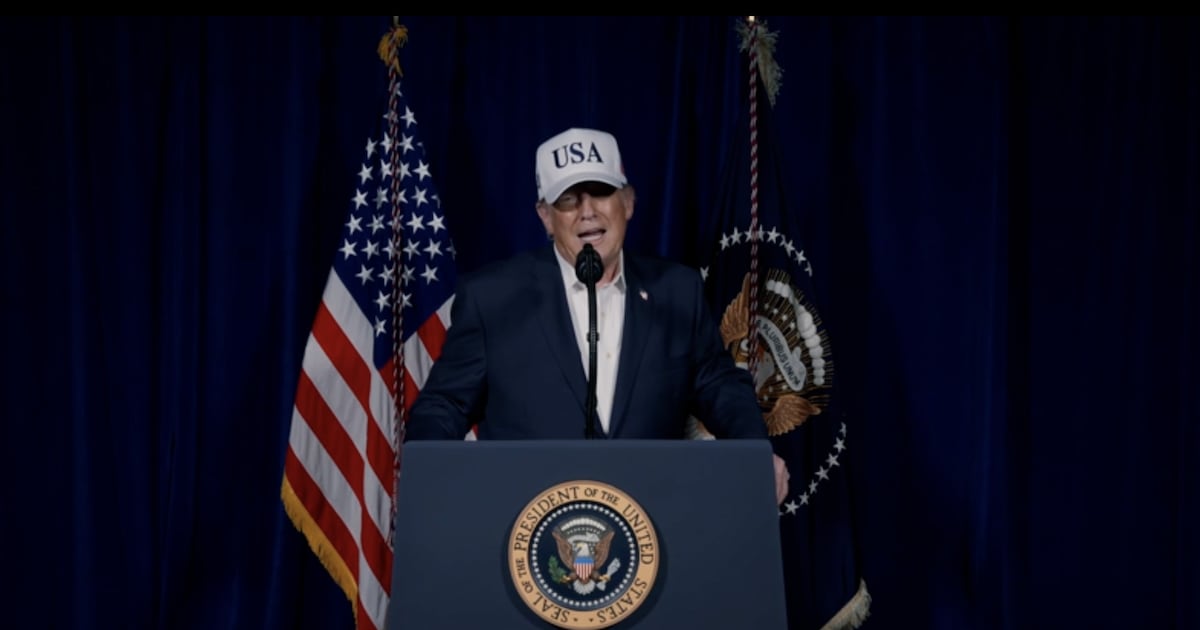The WWE acted swiftly as soon as they heard that an ugly racism scandal was about to break courtesy of Hulk Hogan, their most famous ring icon of the ’80s and ‘90s—and perhaps ever.
First came the Big Boot.
Around 8pm Thursday, according to his attorney David Houston, Hogan learned that The National Enquirer was going to expose his use of several racial slurs captured in one of his 2012 sex tapes with Heather Clem. In it, per transcripts obtained by Radar Online and the Enquirer, Hogan blasts a “black billionaire guy” who offered to finance his daughter Brooke’s musical career.
“I mean, I’d rather if she was going to fuck some nigger, I’d rather have her marry an 8-foot-tall nigger worth a hundred million dollars! Like a basketball player!” he reportedly says. “I guess we’re all a little racist. Fucking nigger.”
The image-conscious WWE stayed in Hogan’s corner when the sex tape first surfaced in 2012, followed by a lengthy and still-ongoing $100 million personal injury suit he filed against Gawker for publishing footage from the tape online.
They again stuck with the wrestling icon through an October 2012 radio interview in which Hogan dropped the N-word while complaining that African-American rappers are allowed to use it to describe him, but not vice versa.
But a full-blown racism scandal could never fly in the brave new era of corporatized, family-friendly WWE-branded sports entertainment. When Hogan called the WWE on Thursday offering to resign, “WWE accepted his resignation from all contractual obligations and proceeded accordingly,” Houston told The Daily Beast.
Friday morning WWE severed their ties to the controversy-plagued icon in spectacular fashion. “WWE terminated its contract with Terry Bollea (aka Hulk Hogan),” they said in a statement, distancing themselves from the racism controversy while reiterating their commitment to “embracing and celebrating individuals from all backgrounds as demonstrated by the diversity of our employees, performers and fans worldwide.”
Then WWE hit Hogan with an Atomic Leg Drop: All references to wrestling’s mustachioed blond Hulkster, its “Unstoppable Force,” its Real American, were scrubbed from the company’s websites and online stores overnight. Hogan’s camp, a source tells me, was “shocked” by the drastic cleansing.
They shouldn’t have been too surprised.
Worldwide Wrestling Entertainment, Inc. has been grappling with criticisms over its treatment of minority characters for decades, plagued by the biggest and most conspicuous critique of them all: Namely, that in six decades the WWE has only dared to declare one black WWE World Champion—The Rock, who is half-Samoan and half-black.
That’s hardly surprising given that until recently WWE barely employed a minority wrestler that hasn’t relied on some kind of exaggerated cultural caricature. Historically, non-white stars have run the gamut of stereotypes heightened to offensive effect, from Ugandan warrior Saba Simba to Kamala the wild savage to the post-9/11 Arab-American character Muhammad Hassan—portrayed by Italian-American Mark Copani—whose WWE run was nixed after a poorly-timed terrorist plotline aired days before the 2005 London train bombings.
Playing into the mantra, “Yo yo yo, pop a 40 and check your rollies—it’s Cryme Tyme,” duo Shad and JTG threatened to “bring the hood” to the WWE while wearing bandanas, counting money, and beating up random white guys and cops.
It hasn’t helped that top brass in the organization have been accused of PC insensitivity themselves, including CEO Vince McMahon. Vince’s cringe-worthy dropping of the N-word was written into the show a decade ago as a humorous bit for his clueless onscreen persona, during a time when current WWE megastar John Cena was best known for spewing ebonics and rapping. The clip resurfaced today as the Hogan firestorm blew up, prompting the WWE to issue this statement to The Daily Beast: “Surely everyone would recognize the 2005 segment was an outlandish and satirical skit involving fictional characters, similar to that of many scripted television shows and movies.”
McMahon’s casual buffoonery might have been a gag, but in 2008, WWE writer Michael Hayes earned a two-month suspension after reportedly dropping an N-bomb at wrestler Mark Henry at a party. The same year, African-American wrestler Bobby Lashley left the WWE after a dustup with the same writer for reportedly making racial slurs at his expense.
Last fall, former WWE star Alberto Del Rio accused a company higher-up of using and enabling casual racism behind the scenes. In Fighting Spirit Magazine, Del Rio described a telephone exchange with the exec after Del Rio was fired for slapping a WWE social media manager for making a racist joke at his expense. The exec was later reportedly revealed to be Executive VP Paul Levesque, better known as WWE Superstar Triple H.
“The person calling me was one of the most important people in the company, and I said, ‘We always hear these racist jokes from you, and because you’re one of the most important people in this company, your other employees hear you making these stupid comments, and they think they can do it,’” Del Rio said.
Blame the ugly tradition on an operatic writing style built on highly simplistic theatrics that leave no room for nuance, set in a heightened world where melodrama rules and white men still outnumber everyone else both in the ring and in the stands.
“Wrestling is designed to push buttons in you,” says a former WWE writer. “The basic business model of wrestling is to sell emotion. So they push those buttons, whatever the easiest button is and whichever’s the quickest button is, because like with any business anywhere if you evoke emotion, you evoke money.”
In rare cases, talent and charisma transcend race and superficial gimmickry, as with the aforementioned Dwayne “The Rock” Johnson, the half-black, half-Samoan 10-time world champion. As Johnson transitioned from pro wrestling’s darling into global movie star in the “post-racial” Fast & Furious sequels, the WWE also made concerted efforts to open its business model to all audiences and demographics.
But even The Rock and current top dog/Make A Wish angel John Cena were involved in a scripted 2011 beef that sparked the company’s PC partnership with The Gay and Lesbian Alliance Against Defamation (GLAAD), in which The Rock called Cena “a Fruity Pebble” and Cena retorted in kind with a homophobia-laden diss rap.
Bringing its complaints to WWE, GLAAD exacted an official apology. Gone were the abrasive days of the Attitude Era; the WWE had initiated a game plan to make wrestling more inclusive, more family-friendly, more responsible, and alienating audiences with offensive stereotypes and even playfully bigoted language was a bad PR move.
They partnered with GLAAD on a number of goodwill initiatives, including the Be A STAR (Show Tolerance and Respect) program, founded two months after the Rock-Cena incident. Intended “to ensure a positive and equitable social environment for everyone regardless of age, race, religion or sexual orientation,” the program is geared toward making WWE safer viewing for young fans—the consumers of the future.
According to numbers issued by the WWE, the company’s fan base skews 55 percent Caucasian and 23 percent African-American—a greater percentage than the 13 percent of African-Americans who comprise the U.S. population, a WWE rep points out.
It’s ironic that an unrelated sex scandal involving one of wrestling’s whitest superstars has sent WWE scrambling to protect itself from scrutiny over its ongoing race problem. “I do not know if Gawker leaked the statement or played any part,” Hogan’s lawyer said, surmising that the “nefarious” party who leaked the N-word-laden transcript was more likely invested in throwing a wrench into Hogan’s ongoing lawsuit than highlighting institutional racism in the WWE. “I do know that I find it exceptionally suspicious and suspect that this three-year-old news story is being leaked to the National Enquirer on the eve of our trial setting.”
The WWE’s race issues are much bigger than throwing bigoted insults around in the arena or someone’s illicitly filmed sex den, which is why Hogan shouldn’t take the complete cleansing of his existence from WWE’s domains personally. Even Booker T, the longtime wrestler many fans and pundits pegged as an African-American Superstar who could’ve taken the top title if he’d been given the chance, chimed in on the N-word controversy and his part in introducing it to the Hogan legacy years ago.
“20 years ago I made a huge mistake by saying something I shouldn’t have on National TV,” he tweeted. “It’s 2015 and the n-word should be eradicated from the English language in my opinion. I am shocked by the statements made by Hulk Hogan. It’s unfortunate, but that’s something that he’s going to have to deal with.”
Earlier this year, African-American WWE-er JTG spoke to the real issue at heart, expressing doubt that fans will see a black champion soon because the cards are stacked and in no danger of changing.
“I don’t see that happening in the near future, no,” he said. “You know to be real and to be very candid and keep it honest, African-American wrestlers, black wrestlers… They have to work twice as hard as white competitors… I do believe that there is a system in place in the WWE that a black wrestler can only go so far.”






